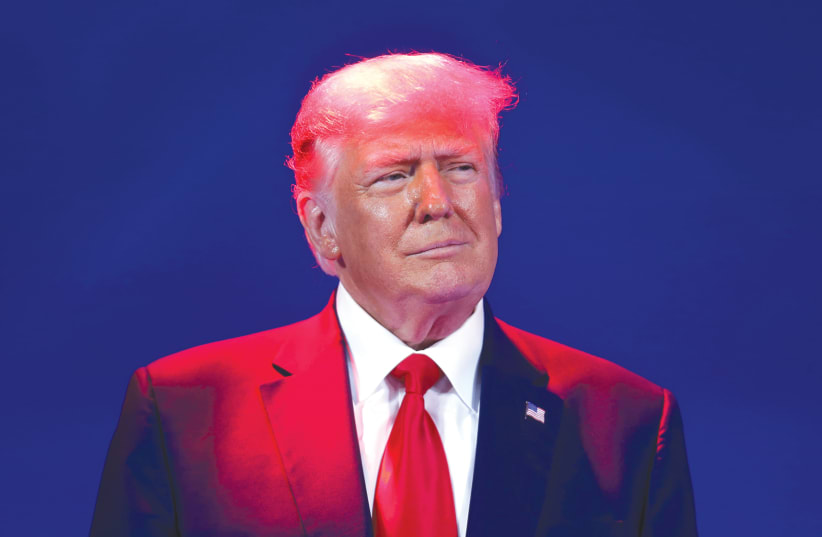The disgraced former president excoriated even his own Supreme Court nominees and other federal judges he picked for not having the “guts and courage” to steal the 2020 election for him despite his losing it by more than seven million votes. Nothing worse in Trump World than an honest judge, I guess.
In a speech to the Conservative Political Action Conference in Orlando, Florida, on Sunday, he aired a bitter and puerile list of grievances, lies and false claims that the election he lost was “rigged.”
He repeated his debunked lies that illegal aliens and dead people voted for his opponent and that voters outnumbered residents in cities like Detroit and Philadelphia, which have large black populations.
Refusing to accept the reality of his defeat, he instead proposed a plan of “comprehensive election reforms” and declared that Republicans want to be “the party of honest elections.” That is coming from the embittered four-time loser who cost his party control of the House, the Senate, the presidency and the battle against COVID-19. The same guy who is under investigation by Georgia prosecutors for trying to strong-arm Georgia Secretary of State Brad Raffensperger to “find” the votes to steal victory away from Joe Biden.
Trump’s not-so-secret strategy is based on fear, nativism and racism, because nothing scares Republicans more than free and fair elections that give minorities full voting rights. That’s why most if not all will vote against the For the People Act, which is scheduled to come up in the House this week.
Before looking at the bill that Trump called a “disaster” and a “monster [that] cannot be allowed to pass,” let’s look at his plan.
He wants single-day voting, no more early voting, voter ID cards, citizenship checks, severe restrictions on absentee and mail-in ballots, and other limitations.
Meanwhile, Republican legislatures and governors around the county are enacting new and tighter restrictions on voting, especially in swing states that went unexpectedly for Biden. These include Georgia, Arizona, Pennsylvania, Florida, Texas, Michigan, Wisconsin and New Hampshire.
One Georgia restriction would eliminate early voting on Sundays, when black churches traditionally hold “Souls to the Polls” get-out-the-vote drives. “This bill is Jim Crow with a suit and tie,” said Aunna Dennis, executive director of Common Cause Georgia.
Restrictions primarily pushed by Republicans around the country involve the times, locations and availability of polling places before and on Election Day, slashing voter registration opportunities and enabling more aggressive voter roll purges, the Brennan Center for Law and Justice reported.
Trump wants only a single Election Day, “not 45,” on which everyone must vote, with exceptions rare and limited to the “very sick, the military or those out of the country.”
THE BRENNAN CENTER for Justice called the GOP war on voting “a backlash to historic voter turnout in the 2020 general election and grounded in a rash of baseless and racist allegations of voter fraud and election irregularities.”
It pointed out that single weekday voting can create problems for those with work, family or other obligations, and produce long lines that discourage voting.
“In-person early voting, including on weekends and during evening hours, helps shorten lines and allows people to cast their ballots when it is most convenient,” the center pointed out.
Trump’s attacks on mail-in voting, which many states have found safe and reliable, might have cost him many votes by discouraging his supporters from using it.
The Republican National Committee has announced a “Committee on Election Integrity” to work with state parties to enact even more restrictions.
Republicans apparently believe the axiom that the larger the turnout, particularly in urban areas, the better it is for Democrats.
That helps explain why Trump so bitterly denounced HR 1, the For the People Act, as a “disaster.” It would expand voting rights, make it easier to cast ballots in federal elections, end congressional gerrymandering (the dirty little secret of GOP election success in the House), modernize registration, enact new campaign finance restrictions, restore and strengthen the 1964 Voting Rights Act, increase access to polls and permit former felons to vote.
That last item seems to particularly gall Trump, who ranted that the bill would “give ballots to felons and welfare recipients.” What upsets him is not that former felons and accused criminals like his rich white pals Paul Manafort, Roger Stone, Mike Flynn, Steve Bannon, Rod Blagojevich and Jared Kushner’s father would now vote. He wants to keep felony disenfranchisement laws because they disproportionately affect poor blacks and other minorities.
“Free and fair elections are the lifeblood of our democracy,” said the Brennan Center, but that’s what led to Trump’s downfall. When his attorney-general, Bill Barr, said there was no evidence of widespread voter fraud last November, he found himself out of a job.
Trump’s refusal to accept the truth led him to incite a deadly insurrection that saw mobs of his followers assault the US Capitol and resulted in his second impeachment.
He went to CPAC in Orlando Sunday to perpetuate his lies, to vow revenge on those who voted to impeach and remove him from office, and to call for a new assault on American democracy by imposing harsh restrictions on the free exercise of voting rights.
Congress will have an opportunity to “preserve, protect and defend” our most precious constitutional right when the For the People Act comes for a vote.
